I've turned my focus back to programming with PHP. With very technical material, I seem to learn best after taking a break & putting it aside for several weeks. Maybe I need the time to digest.
Good to be back in the programming world. Things clicking much more smoothly now, conceptually. The next course focuses on OOP.
But still find my thoughts drifting back to Nietzsche occasionally .. specially during that first sip of coffee in the morning. Also in the steamy shower.
 Ever seen the movie » Murder by Numbers (2002), starring Sandra Bullock? The story seems farfetched, but is actually based on real life events (.. something I didn't know 'til last week).
Ever seen the movie » Murder by Numbers (2002), starring Sandra Bullock? The story seems farfetched, but is actually based on real life events (.. something I didn't know 'til last week).
In May of 1924, two wealthy kids, both "exceptionally intelligent," ages 18 & 19, named Nathan Leopold & Richard Loeb, from the University of Chicago, planned & executed (tried to, anyway) "the perfect murder."
Their motive? Get this:
Leopold, 19 at time of the murder, and Loeb, 18, believed themselves to be Nietzschean supermen who could commit a "perfect crime" (in this case kidnapping and murder).
Before the murder, Leopold had written to Loeb: "A superman ... is, on account of certain superior qualities inherent in him, exempted from the ordinary laws which govern men. He is not liable for anything he may do."
 Here's what their high-power defense attorney argued to keep them out of the electric chair at Joliet:
Here's what their high-power defense attorney argued to keep them out of the electric chair at Joliet:
"Is any blame attached because somebody took Nietzsche's philosophy seriously and fashioned his life upon it?... It is hardly fair to hang a 19-year-old boy for the philosophy that was taught him at the university."
What's *really* weird .. is that these kids were both Jewish. And they killed another Jewish kid (.. bludgeoned in the backseat with a chisel). They saw themselves as Jewish Nietzschean Supermen (.. übermensch).
Ooh, I just realized this was 1924 .. some 15 years *before* WW II, and 18 before Jews started being exterminated at Auschwitz. (.. by Nazis who championed Nietzsche's ideas). Interesting, no? Doubt many Jews subscribed to his philosophy afterwards.
••• today's entry continues here below •••
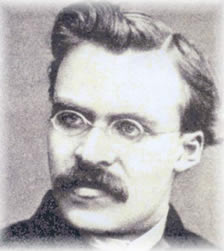 » Insight vs Conclusions | The Rub
» Insight vs Conclusions | The Rub
In thinking about Nietzsche from a distance .. having put down the book a week ago .. what sticks with me is how he really shines at making keen observations.
This might be because he sees the world differently. Or maybe his brain is wired differently. Whatever the reason, he questions things you & I take for granted.
And the things we take *most* for granted, and are most-sure about .. such as our ideas about right & wrong (morals) .. he questions MOST vigorously.
And these keen, perceptive observations that Nietzsche makes are things we have not noticed ourselves, yet instinctively agree with, saying, "Yes, of course. I can see where Nietzsche is correct."
But then Nietzsche uses these wonderfully insightful observations to attack moral positions we take for granted as instinctive truths. So the result is somewhat confusing .. one of » "Yes, of course," followed immediately by, "No, impossible." And therein, as the Bard puts it, lies the rub.
A source of inner conflict that causes turmoil down on the level where morals live & breathe .. below & beyond the intellect. You start doubting yourself, thinking » "If Nietzsche saw SOME things I didn't see (regarding his insightful observations), then maybe he sees *other* things I don't see (regarding his position on morals)."
Notice how these two kids were both described as "exceptionally intelligent". Leopold, an expert ornithologist, often lectured at Harvard. If intelligence alone were able to defend against Nietzsche's ideas, they would've been well able.
The question always before us (as we read Nietzsche) » If he was so brilliantly insightful in his observations (.. and he was), how could he be so wrong in drawing his (moral) conclusions? This is really the Nietzsche question that works on you.
 » Value of Nietzsche's Ideas
» Value of Nietzsche's Ideas
Then, of course, you start wondering » was there any validity at all to his ideas? And if so, how much?
If history has taught us anything it's that even the fool can be right occasionally. And Nietzsche was no fool.
If nothing else, Nietzsche's ideas are interesting cuz they're so far OUT THERE (the 'spectacle' effect), and Nietzsche expresses them so forcefully. In other words, Nietzsche is entertaining. Not boring.
[ For preparation for my oral boards in the Navy's Nuclear Power program, they coached me, in the event I don't know a particular answer, to speak forcefully, like I *did* know .. to make up some b.s. .. cuz the questioner himself sometimes doesn't know the answer, either. And if he asks if you're sure, act like you are. In this way you can score points even when you don't know something. =)
Note how they coached me to lie, and lie *forcefully*. Does that mean the military is immoral? Or just smart? What would Friedrich say? ]
No doubt Nietzsche scores points using this technique. Yes, he seems very confident of his ideas. Nothing wishy-washy about Nietzsche. (Personally, I see nothing wrong with not knowing everything.)
Philosophy typically functions in the intellectual realm. Yet Nietzsche's ideas somehow transcend the intellect. They are therefore powerful in a way I do not (yet) fully comprehend.
Also note that these kids were young (18 & 19). Yes, very intelligent, but young. While cynicism tends to accompany the advancement of age, youth is impressionable.
[ Hitler, you might argue, in the beginning, wasn't so developmentally different from these two kids. ]
The gist of what Nietzsche says (my own words) » these superficial values (regarding morals) may be necessary for lower, unenlightened beings, but if we're going to move the species into the next millennium, into the next phase of human development, then some of us will need to jettison that old, tired, antiquated, religious-based system of values, which is holding us back.
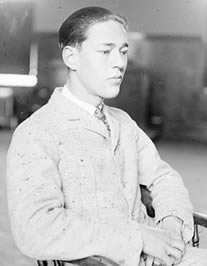 » Understanding Nietzsche
» Understanding Nietzsche
Now I have not validated the ideas presented here, as he seems to have an agenda .. beyond merely understanding Nietzsche (.. an agenda which may in fact be valid, but nothing I've read confirms his points), but this guy says (~ a quarter of the way down the page):
"People who love Nietzsche for his celebration of creativity and his dismissal of the moralism of traditional religion, mainly meaning Christianity, usually seem to think of going "beyond good and evil" as merely legitimizing homosexuality, drugs, abortion, prostitution, pornography, and the other desiderata of progressive thinking.
They don't seem to understand that Nietzsche wasn't particularly interested in things like that, but, more to the point, legitimizing rape, murder, torture, pillage, domination, and political oppression by the strong.
The only honest Nietzschean graduate student I ever met frankly stated, "To be creative, you must be evil."
We get something similar in the recent Sandra Bullock movie, Murder by Numbers [2002], where the young Nietzschean student simply says, "Freedom is crime."
The story of the movie is more or less that of Leopold and Loeb, the Chicago teenagers who in 1924 murdered a young boy (Bobby Franks) to prove they were "beyond good and evil." Leopold and Loeb understood their Nietzsche far better than most of his academic apologists."
Despite this commentary, I find it difficult to believe Nietzsche advocated such things (like rape & murder), and I never read anything where he himself does.
 But how'd you feel if somebody called and said, "Two college kids read your book and used the ideas they found there to go out and kill an innocent boy .. just for the thrill of it."
But how'd you feel if somebody called and said, "Two college kids read your book and used the ideas they found there to go out and kill an innocent boy .. just for the thrill of it."
I could go on, cuz there's lots more to be said, especially about morals (right & wrong) .. which all of us are familiar with from an early age .. but it's late & I'm tired. May add to it later.
Consider how one of the very first words we teach our children is » GOOD. But here we do not mean "not evil," which is how religion uses it. No, we mean "it's good FOR you" .. in the way Nietzsche uses it. Right?
I mean, 'bad" becomes synonymous with things that serve to 'decultivate' (harm) our little tykes. (Because they are too young to understand religious concepts of good & evil.) It's 'bad' to play with matches.
I was never taught Nietzsche in school .. not even in college Philosophy .. tho Beyond Good & Evil was included on the reading list.
I found it difficult however, to make headway reading on my own .. without a serious commitment. And since we weren't tested on the material in the text, my motivation never exceeded that of intrigue in a curious title.
Speaking of curiosity .. do they teach Nietzsche today? In either high school or introductory Philosophy? That Philosophy class was one of my top 3 or 4 favorite college classes. (It's really all about the professor.)
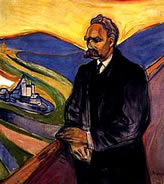 So here you get a feel for the power of Nietzsche's ideas. Not only were they able to seduce an entire nation, but they were also able to sway two 'exceptionally intelligent' college students here in one of our nation's most prestigious universities .. to do the unthinkable.
So here you get a feel for the power of Nietzsche's ideas. Not only were they able to seduce an entire nation, but they were also able to sway two 'exceptionally intelligent' college students here in one of our nation's most prestigious universities .. to do the unthinkable.
Powerful stuff, Nietzsche. Nuclear grade, dawg.
[ The Rad server, where you're loading this page from, is physically located downtown Chicago, a few miles from the University of Chicago campus. ]
I most admire Nietzsche for the courage he displayed in fearlessly attacking the status quo. Look at what he said about members of his philosophical community.
"They are sly spokesmen for the prejudices they christen as 'truths,' being far from the courage of conscience to confess this fact. They take conjecture, or a whim, or more typically, some fervent wish they have sifted through and made properly abstract, which they defend with rationalizations after the fact.
The spectacle of their tartuffery provides no small amusement for discriminating spectators like us, who keep a close eye on the cunning tricks of the old moralists and preachers of morals."
Nietzsche would not be surprised to learn that people who work in the Financial industry are primarily concerned with enriching » themselves.
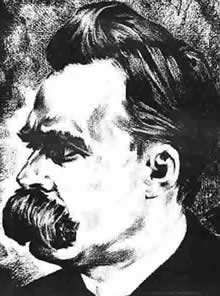 » Falsity Valued Above Truth
» Falsity Valued Above Truth
I'll close today with one of Nietzsche's mind-blowing ideas (quoted from the text). Check it out:
"We do not consider falsity as itself an objection to a judgment. This is perhaps where our new language will sound most foreign. The real question is how far the judgment promotes and preserves life, how well it cultivates the type.
We claim that the falsest judgments are the most indispensable to us. Without accepting the fictions of logic, people could not live. A renunciation of false judgments is a renunciation of life.
To acknowledge untruth as a necessary condition of life means resisting the usual value feelings in a dangerous manner. A philosophy that risks such a thing would, by this gesture alone, place itself beyond good and evil."
Not sure about who is the 'we' Nietzsche mentions there. But he seems to be saying that a judgment's validity (truth) is not as important as how it affects life and 'the type.'
In other words, a true/valid idea should not (necessarily) be valued more highly than one which merely appears true (.. but is actually false). If I read him correctly. (And it is certainly possible that I misinterpret him.)
The problem, it seems, is defining WHO does determining, WHICH falsehoods are prized most highly. No? And what 'TYPE' we're talking about. Of course, the implication here is » "Me & my type do the determining regarding which falsehoods are deemed most valuable." (Not you & yours .. unless you happen to be included in my type). Long live the geeks! =)
I don't have to tell you that falsity has always been with us, and will continue to be a part of our lives. But to value it above the truth does seem strange (foreign).
The clearest mental reprsentation I've found comes when you compare something that LOOKS true with something that IS true.
Consider their respective VALUES for a moment. Now, if you esteem the value of the thing which merely LOOKS true as being higher than that which actually IS true [ .. cuz maybe now you can use it to DECEIVE someone, and perhaps gain an advantage over them, and thereby advance your 'type' .. especially if another type is trying to lay the smack down on you ] .. the question is » are you immoral if you do?
Machiavelli seemed to have some things to say along these lines. So yes, there's a case to be made for the value of untruths and falsities and lies & deception & appearances & mendaciousness .. especially if these things are being used against you & your type.
The military has made a science of the art of deception » counter-intelligence.
Nietzsche says (my words) » "We don't care if a judgment is true or false. We only care (value) how well it promotes life (our life), and how well it cultivates the type (our type). Therefore a false judgment that promotes life is more valuable than one which is merely true."
Remember what Jack Nicholson said in the movie titled A Few Good Men? » "You can't handle the truth!"
Nietzsche says, "You don't even *want* it!"
Nietzsche says we are unknowingly deceived, right now, by our dysfunctional sense of morals:
"Most of conscious thought can be attributed to instincts, which secretly direct and force conscious thought into determinate channels."
The Rad translation:
"You've been brain-washed, Dawg, and the sad thing is you don't even know it."
If you think about it, have not our morals, our sense of what is right & wrong .. have not they the same functional characteristics as instincts? In other words, we don't have to go check with Google to know what does & doesn't seem right.
Certainly a plausible notion when you consider how many (most?) animals operate entirely on instinct. Just because we have risen above other animals doesn't mean we are immune to our animal instincts.
Don't we sometimes find ourselves crouching in the tall grass like a cheetah when we spy a particularly fit woman walk by? Happens on its own » instincts. Speaking of fit women...
 » The Blue Woad Effect
» The Blue Woad Effect
Assuming his philosophy does indeed suggest that the death of innocent people is okay .. uh, I see his biggest short-coming as the failure to recognize something I call » the blue-woad effect.
( .. which is surprising, given his lengthy discourse on human nature).
Remember how Mel Gibson painted his face blue in Braveheart? That's the blue-woad effect. It basically means » "I will kill you or die trying .. so help me god."
It happens when somebody is really, really pissed off. When their inner moral instincts tell them a grave injustice has been committed .. so great that it must be answered .. with extreme prejudice.
We're talking about imperatives such as that caused by invading another country and raping their women. Things like that tend to piss people off. And anger can be a powerful motivator. Specially for folks who'd rather not consider themselves supermen .. but will don the suit .. if need be. (The blue one.)
Richard Loeb was killed in prison. Sliced 58 times with a straight razor .. most of them defensive cuts on the forearms. The murder was ruled 'self-defense,' even tho the other guy didn't have a scratch on him & Loeb's throat was cut from behind. Hmmm.
Can't go around playing Mr. Bad-ass Superman with innocent people and think there won't be a day of reckoning.
The Russians didn't paint their faces blue, but they marched into Berlin very pissed off. Everybody stepped out of their way. To let them have their revenge. No one expected them to be merciful.
And here they did not disappoint. I doubt anybody there, moral or otherwise, felt bad about it. They just turned and walked away .. as the screams faded to distance echoes. And the rest, as they say, is history.
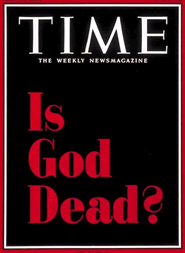 Recall what Nietzsche said:
Recall what Nietzsche said:
"To acknowledge untruth as a necessary condition of life means resisting the usual value feelings in a dangerous manner."
Ya think?
For more along these lines here's a Google search preconfigured for the query » friedrich nietzsche leopold loeb perfect murder superman ubermensch
Update 17.Nov.2010 - Okay, I read a little more on Leopold & Loeb. They had a LOT more going on than Nietzsche. I mean, they were problems withOUT Nietzsche.
Not that Friedrich didn't lend instability to the relationship. But he isn't the causa prima here. Not by a long shot.
And here's a quote I found amusing » Most philosophers write such dense prose you need considerable training just to misunderstand them. But Nietzsche's writing is so clear that it can be misunderstood by most anyone. =)
People have been telling me this last week that my smile looks good. Don't recall that ever happening before.
While I can't say Friedrich is the one making me smile, I can verify that I do indeed find it easier to smile .. sorta like the feeling that comes when you've been thru hell and think you might've survived (.. tho not without scar).
The smiles come easier & I'm able to make people laugh again. Could it be that Nietzsche is cathartic?
